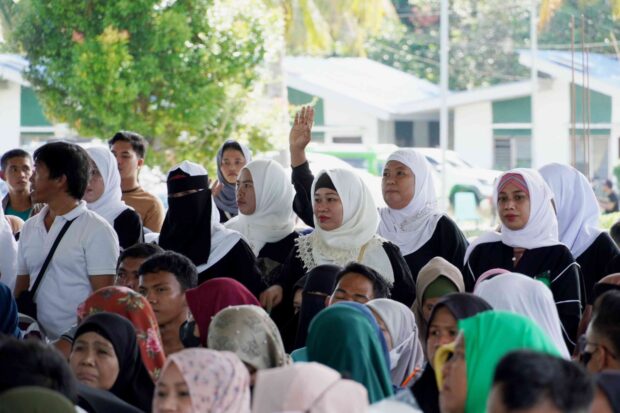
DIFFERENT BATTLE Former medics of the Moro Islamic Liberation Front have been tapped to serve their communities as barangay health workers for the Bangsamoro Autonomous Region in
Muslim Mindanao (BARMM). Trained in basic health delivery, emergency response and patient transport, they are now part of the personnel of the BARMM’s Ministry of Health. —PHOTO COURTESY OF BANGSAMORO INFORMATION OFFICE
COTABATO CITY—Jasil Abdulnaser, 28, remembers that some six years ago, she decided to follow in the footsteps of her father, a Moro Islamic Liberation Front (MILF) fighter, in advancing the Bangsamoro cause.
But instead of being a combatant, Abdulnaser served as a medic for the group.
Today, more than nine years after the MILF clinched a peace deal with the government, the Bangsamoro Autonomous Region in Muslim Mindanao (BARMM) has enlisted her into its brigade of “health warriors.”
Along with 1,048 other former MILF medics, Abdulnaser is now part of the corps of barangay health workers (BHWs) of the Ministry of Health (MOH), overseeing healthcare delivery in their respective communities.
She has been volunteering to be a BHW in her village in Barira town, Maguindanao del Norte, since 2022. The other BHWs have started their volunteer service in their own villages in Maguindanao del Norte, Cotabato, and Lanao del Sur provinces in January this year.
“I decided to continue my father’s struggle [and] I will continue his legacy of serving the Bangsamoro people,” Abdulnaser said. “I hope the other former medics and children of combatants will do the same—serve the Bangsamoro,” she added.
Well-trained
From mainly taking care of the health and medical needs of MILF combatants and their families, they now serve the entire community.
To help them transition into their new work, the former MILF medics underwent training on basic health services delivery, emergency response, and handling and transport of patients, especially those coming from far-flung areas.
On Monday, the new BHWs were given P24,000 each by the MOH representing their allowance for the entire year, in a ceremony inside the MILF’s Camp Darapanan. The program was led by BARMM Health Minister Rizaldy Piang and Deputy Minister Zul-Qarneyn Abas.
Piang urged the new BHWs to keep their dedication to rendering services to their respective communities, just like when they were still active in the Moro revolution.
“You’re not just a barangay health worker but you’re a well-trained health worker serving your own community. Acknowledge that you have huge roles and significant contributions to your communities, even in the midst of an armed struggle [before],” Piang said.
INCENTIVE Bangsamoro Health Minister Dr. Rizaldy Piang (with microphone) and other officials from the Ministry of Health lead on Nov. 27 the cash allowance distribution to 1,049 former Moro rebels who became barangay health workers for the regional government. —PHOTO COURTESY OF
BANGSAMORO INFORMATION OFFICE
Peace process
Dr. Kadil Sinolinding Jr., chair of the Bangsamoro parliament’s committee on health, said the transition of former MILF medical staff into government health service providers “is another remarkable dividend of the Mindanao peace process.”
Under the 2014 peace agreement, the MILF’s armed wing, the Bangsamoro Islamic Armed Forces, is to undergo a decommissioning process that seeks to “put beyond use” its army of combatants and their firearms.
Part of the normalization measures spelled out in the agreement is transforming once MILF strongholds into peaceful and productive communities.
Sinolinding said they were looking forward to enlisting more MILF medics into the region’s health system to help fill the gaps in basic health services delivery across its communities.
READ: Palace: Majority of 80-man BTA most likely be from MILF